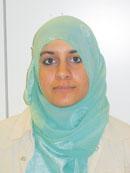As diverse as America is, Americans still hold misconceptions about Islam after 9/11. Six years after the terrorist attacks, many American Muslims continue to face discrimination and stereotyping because of their Islamic attires or identities.
Where does such discrimination stem from? From information outlets, in part. Representatives of the mainstream media tend often to be poorly informed or just biased. In an age of increasing corporate centralization, there are few avenues that the average American is privy to in the first place. The Western media constantly refers to the Muslim world with implied or direct stereotypes. News stations do not even try to educate the masses about what Islam really is all about. Newspapers and magazines show few positive images of Muslims to the American public. Mainstream American bookstores are stocked with innumerable Islam bashing authors, like Robert Spencer, in the name of capitalism.
With over seven million Muslims in the United States now is the time to educate the American public, from academics to blue collar workers, about Islam. A recent US survey showed that even with the visibility of Muslims in America, a majority of Americans know little about the practices of Islam and do not see much common ground between the Muslim faith and their own Christian beliefs, though both stem from Abraham by way of Judaism. Very little has improved in terms of awareness about Islam since 2001. “Fifty-eight percent say they know little or nothing about Islam’s practices,” concluded the Pew Research Center for the People and the Press and the Pew Forum on Religion and Public Life in 2005. About a third of those polled, including half of those who offer a negative opinion of Muslims, said what they have seen or read in the media has the biggest influence on their perspectives.
For example, more and more Americans equate negative words (i.e. radicalism, terrorism, fanaticism) with Islam. Forty-five percent of those polled by Pew said Islam was more likely than other religions to encourage violence among its believers. Even the head of the Union for Reform Judaism, America’s largest Jewish organization, has accused US media and politicians of demonizing Islam and portraying Muslims as “satanic figures.”
Fortunately, there are some positive outcomes of the survey. Pew found that knowing a Muslim is usually associated with more positive views of the religion: “Among those who know a Muslim, 56 percent have a favorable overall impression of Muslims, compared with just 32 percent of those who are not acquainted with a Muslim.” As a grassroots Muslim American activist, I believe educating America about Islam must be a grassroots movement. At UMass Boston, the Muslim Student Association is on campus for a crucial purpose: to foster awareness and open dialogues about Islam with the UMass public, from students to faculty and staff. There are professors who realize how critical it is to educate students on such a relevant topic to all Americans. I encourage more professors to invite Muslim speakers to raise awareness on the reality of Islam, dispelling myths the media endlessly portrays. Students should not shy away from approaching fellow Muslim students, for we are all classmates and should be able to see each other through almost a neighborly lens of respect and reciprocity, of understanding, etiquette, and kindness. Most of all, as I see it, it is incumbent to all Muslims to speak up for our religion.
Just recently, I heard a student say, “where are the moderate Muslims?” From this statement I am motivated to write to you all and let you know, we do exist! Unfortunately, the media does not often allow you to hear our voices, because controversy makes for better headlines. Thankfully, the Mass Media allows our voice to be heard. This is a positive step in the direction of educating the public about Islam. As a key result of the poll stated, being acquainted with a Muslim allows an American to positively view Islam. I am going to allow you all to gradually see different aspects of Islam, illustrating the differentiation of cultural twisting of religion versus what Islam says in our Qur’an and way of the Prophet Muhammad (peace be upon him). With more and more students yearning to separate what the media tells them from what Islam factually is, I am going to try and help with this movement of education.
I am not yet a scholar of Islam, but we do have numerous scholars. I am going to try my best to bring our voices to you. If there any topics of interest people are curious to read about in future articles in the Mass Media please email me: [email protected].

